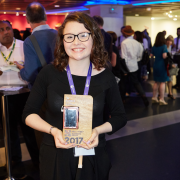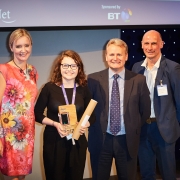What happens when two 14-year-old tech-minded friends witness some of their closes classmates and family really struggling with dyslexia?
Roughly three children in every class is likely to be dyslexic, and the opportunity to flourish in lessons and in life can become very difficult without tailored support.
Kiera McKillop (pictured below with award) and Sinead McKeown, from St Killian’s College in Northern Ireland wanted to do something to help their friends and got to work with their coding skills to create the winning entry in the BT Young Pioneer category at the AbilityNet Tech4Good Awards 2017.
Their prototype for their Dyslexic Aid has been created using a Raspberry Pi computer and picked up the coveted award at BT Centre last week.
McKillop, who attended with her mum because classmate Sinead was on holiday, said: “We seemed to see lots of people around us with dyslexia, including our best friend and thought it would be a good idea to do something to help.”
“We actually can’t believe that we have won this award. We have worked really hard on Dyslexic Aid and winning the BT Young Pioneer Award is just the best feeling. This is just the start for us and we are going to keep on inventing and inspiring others.”
The two, friends since the start of high school – one a big fan of coding and tech, the other, a non-sporty type looking for a new hobby – connected with the British Dyslexia Association and the University of Ulster and did their own research on what was needed in this space. The result is a device designed to be a low cost learning aid, featuring games to help young people with dyslexia learn how to recognise letters and spell words.
Learning games to support children with dyslexia
There are three games on the device, one is a tracing game, which encourages children to trace letters of the alphabet on screen with their finger. The next is a spelling guessing game, which gives users 10 tries to get a word right before they move to a harder word.
The teenagers specifically wanted to give gamers lots of chances to get a word right, so there was maximum chance of users feeling accomplished and more confident.
The third game is based around orientation and invites users to turnaround letters which might be upside down or back to front and put them into their correct position.
Gamers can learn words in multiple ways with the device, including through seeing, hearing, writing and saying letters and words, to ensure those with different learning styles can benefit.
“Younger pupils really like what we’ve shown them and how the games work. We now just want to refine the device so it has less wires and is a bit smaller. We want it to be inexpensive as lots of people who need this won’t be able to afford something expensive,” said McKillop.
From prototype to market?
Now on their summer break, the two will look at developing new games when back to school in September.
“The awards ceremony was overwhelming, everyone wanted to talk to me, it was exciting,” says McKillick, who attended with her mum, as her classmate was on holiday. “It was amazing to meet Maggie Philbin who my mum knows from Tomorrow’s World; I also saw her on Bang Goes the Theory. And I got my picture with Kate Russell (pictured far left, above with Kiera) who I wasn’t expecting to even talk to me!”
Ian Caveney, senior consultant in sustainable business at BT, praised the inventors: “What impressed us about Dyslexic Aid is how it has brought technology to help support those with an existing difficulty in a new and innovative way. At the same time, the work of Kiera and Sinead should inspire all young people, and those with dyslexia in particular. It truly shows what you can do with simple, but powerful technology.
“We hope the recognition from this award will help them go on to take the Dyslexic Aid from prototype to marketable reality.”
Now in their seventh year the awards recognises organisations and individuals who use digital technology to improve lives.
See the full list of AbilityNet Tech4Good Awards 2017, sponsored by BT, here.







